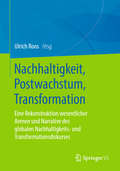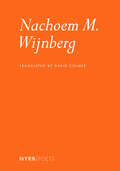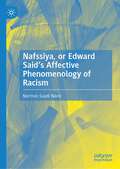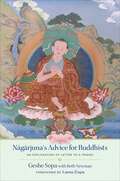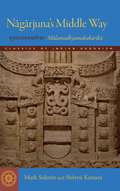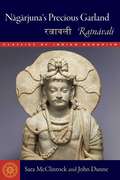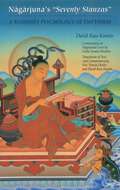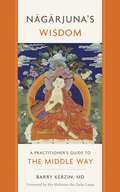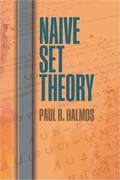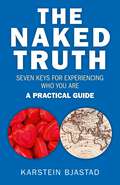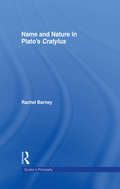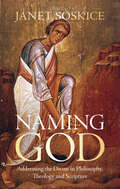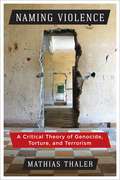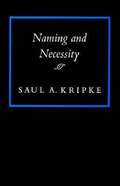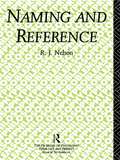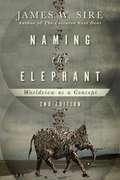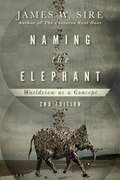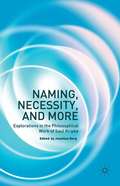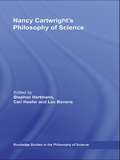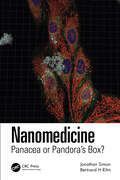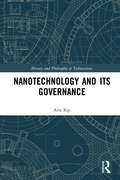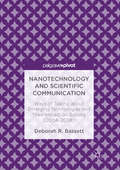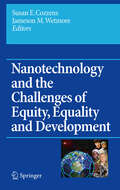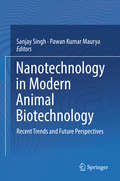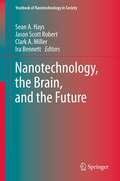- Table View
- List View
Nachhaltigkeit, Postwachstum, Transformation: Eine Rekonstruktion wesentlicher Arenen und Narrative des globalen Nachhaltigkeits- und Transformationsdiskurses
by Ulrich RoosDer Band versammelt zentrale Befunde abgeschlossener Forschungsarbeiten zur Frage der Entwicklung des globalen Nachhaltigkeitsdiskurses. Welche Narrative, Strategien, Ziele und Werte bestimmen den Kampf um Definition und Ausgestaltung nachhaltiger Politik? Welche Transformationsprozesse sind erkennbar, werden initiiert, gefordert oder bekämpft? Und welche Bedeutung kommt hierbei wirtschaftswissenschaftlichen Konzepten zu Wirkung und Relevanz von Wirtschaftswachstum sowie den hieran geäußerten Kritiken zu?Um diese Fragen zu beantworten, werden verschiedene Arenen des deutschsprachigen Nachhaltigkeitsdiskurses – Arbeit, Bildung, „Entwicklung“, Ethik, Transformation – detailliert rekonstruiert, um auf Grundlage der daraus resultierenden Gesamtschau des ökologisch-ökonomisch-politischen Systems die gegenwärtig hegemonialen Handlungsregeln und -logiken zu erkennen und kritisch zu reflektieren.
Nachoem M. Wijnberg
by Nachoem M. WijnbergA new translation of work by one of the Netherland's most innovative, exhilarating poets, a poet who draws on everything from economics to parables to world history. The Dutch poet Nachoem M. Wijnberg is one of the most inventive, surprising, entertaining, and thought-provoking poets writing today. He is also remarkably productive, so that up to now only a small portion of his extensive body of work has appeared in English translation. This new selection of poems draws on all twenty volumes Wijnberg has published to date, constituting an indispensable introduction to this wry, off-kilter, spellbinding modern master. Wijnberg, not only a poet but a professor of business studies—hence his persistent concern with questions of value, real and false—writes only in the plainest language while displaying a formidable erudition. His poems engage economics, philosophy, and history; he writes Chinese poems and Jewish poems and classic songs; he tells stories that may or may not be parables; he writes from where the mind meets the heart. &“Tell all the truth but tell it slant,&” Emily Dickinson enjoins. Wijnberg for his part has said, &“Alienation is the last thing I am trying to achieve. The world is strange enough as it is and my poems help in dealing with that strangeness by bringing it close and as far as possible trying to understand it.&”
Nafssiya, or Edward Said's Affective Phenomenology of Racism
by Norman Saadi NikroThis book adapts the Arabic term nafsiyya to trace the phenomenological contours of Edward Said’s analysis of the affective dimensions of colonial and imperial racism. Reflecting on what he called his “colonial education,” Said rendered his Palestinian/Arab background and experience of racism an enabling component of his academic work. The argument focuses on his “personal dimension” section in his introduction to his famous volume Orientalism, discussing key notions of Said’s oeuvre—such as ‘elaboration,’ ‘circumstance,’ ‘humanism,’ ‘worldliness,’ ‘inventory,’ and ‘critical consciousness.’ Providing a lengthy study of his earlier and somewhat neglected Beginnings: Intention and Method, the book discusses the significance of the style of the essay as a key component of what the author calls Said’s interventionist brand of scholarship. The final chapter outlines how Said’s oeuvre can be situated in a genealogy of a radical phenomenology of racism that emerged from the colonies.
Nagarjuna's Advice for Buddhists: Geshe Sopa's Explanation of Letter to a Friend
by Lhundub SopaA modern commentary by a beloved Tibetan teacher on a classical Indian Buddhist text and an introduction to Buddhism by one of the tradition&’s most famous authors. A teaching on how to live a Buddhist life in contemporary society.Letter to A Friend, by the great Indian philosopher Nagarjuna, is one of the best-known introductions to Buddhism in classical Indian Buddhist literature. In this warm and generous commentary, one of the twentieth century&’s most beloved teachers, Geshe Lhundup Sopa, shows how Nagarjuna&’s advice on how to follow Buddhist ethics while living fully in the world speaks just as clearly to us today as it did to the Indian king for whom it was composed. Nagarjuna maintained that all Buddhists can embody the full teachings of the Buddha. Therefore, this book covers topics from simple virtues to the most profound truths of emptiness. Expertly compiled by his student, scholar Beth Newman, from talks given over a number of years, the commentary brings this ancient Buddhist teaching to a modern audience.
Nagarjuna's Middle Way
by Mark Siderits Shoryu KatsuraNagarjuna's renowned twenty-seven-chapter Fundamental Verses on the Middle Way (Mulamadhyamakakarika) is the foundational text of the Madhyamaka school of Mahayana Buddhist philosophy. It is the definitive, touchstone presentation of the doctrine of emptiness. Professors Siderits and Katsura prepared this translation using the four surviving Indian commentaries in an attempt to reconstruct an interpretation of its enigmatic verses that adheres as closely as possible to that of its earliest proponents. Each verse is accompanied by concise, lively exposition by the authors conveying the explanations of the Indian commentators. The result is a translation that balances the demands for fidelity and accessibility.
Nagarjuna's Precious Garland: Ratnavali (Classics of Indian Buddhism)
by Sara McClintockDiscover the eloquence and insight of the philosopher Nagarjuna, held by tradition to be a second Buddha, in this concise instruction for a king that is considered a masterpiece of Buddhist literature.In this profound work of five hundred verses, we encounter a presentation of Buddhism that integrates both the worldly and the transcendent. The clear and sagacious advice laid out on every page serves as a road map to one&’s highest goal—whether that goal is a better life, here called the Dharma of ascendance, or the ultimate one of spiritual freedom, the Dharma of the highest good. The verses, written for an unnamed ruler, touch on questions of statecraft, but their broader themes speak to us today because they tackle the difficulty of integrating one&’s spiritual journey with the social and political demands of daily life. Nagarjuna was an Indian Buddhist teacher, probably of the second century CE, who was renowned for his astute articulation of the philosophy of the Middle Way (Madhyamaka). His thoroughgoing critique of all forms of essentialism became a touchstone for Mahayana Buddhism in India, Tibet, and throughout East Asia, and his importance for the development of the Mahayana tradition can scarcely be exaggerated. The translators here first rendered Nagarjuna&’s letter for the Dalai Lama&’s teachings on the work in Los Angeles in 1997. While that commemorative edition was translated from the Tibetan, the present volume prioritizes the surviving Sanskrit verses along with the only known Indian commentary, by the eleventh-century scholar Ajitamitra. This is the first complete translation in English of the Precious Garland that takes the Indian text and commentary as its primary authorities. In addition, the translators provide rigorous working editions of the Sanskrit and Tibetan verses they translate. This elegant and precise rendering of Nagarjuna&’s work is certain to become the touchstone translation of this celebrated Buddhist text.
Nagarjuna's Seventy Stanzas: A Buddhist Psychology of Emptiness
by David Ross KomitoThis volume contains a translation of Seventy Stanzas, a fundamental work of Nagarjuna on the Madhyamika system of Buddhist philosophy, along with a commentary on it from the Prasangika viewpoint by Geshe Sonam Rinchen. David Komito summarizes basic Buddhist doctrines on perception and the creation of concepts, which have traditionally served as the backdrop for Nagarjuna's teachings about how people consistently misperceive and misunderstand the nature of the reality in which they live and the means through which they experience it. This book will interest Buddhist practitioners, scholars, and psychologists who seek a deeper understanding of Buddhist psychology and epistemology.
Nagarjuna's Wisdom: A Practitioner's Guide to the Middle Way
by Barry KerzinExplore the Mulamadhyamakakarika the way the Dalai Lama teaches it.Nagarjuna’s Fundamental Verses on the Middle Way, or as it’s known in Tibetan, Root Wisdom, is a definitive presentation of the doctrines of emptiness and dependent arising, and a foundational text of Mahayana Buddhism. In this book, Barry Kerzin, personal physician to the Dalai Lama, presents this fundamental work in a digestible way, using a method favored by His Holiness: focusing on five key chapters, presented in a specific order. First we explore the twelve links of dependent origination, in Nagarjuna’s chapter 26, to learn why and how we cycle through sa?sara. Then we examine the self that cycles to discover that, in fact, there is no inherently existent self, based on Nagarjuna's chapter 18. We then enter an analysis of the four noble truths, based on chapter 24, to understand how conventional reality is understood. Next, an investigation of the Tathagata shows the reader that even emptiness is empty in chapter 22. Finally, Nagarjuna re-emphasizes the pervasiveness of emptiness in his first chapter. Thus, Dr. Kerzin walks us through Nagarjuna’s masterwork and lets the great teacher introduce us to Buddhist philosophy, step by step—deepening our understanding, enhancing the way we practice.
Naive Set Theory (Dover Books on Mathematics)
by Paul R. HalmosThis classic by one of the twentieth century's most prominent mathematicians offers a concise introduction to set theory. Suitable for advanced undergraduates and graduate students in mathematics, it employs the language and notation of informal mathematics. There are very few displayed theorems; most of the facts are stated in simple terms, followed by a sketch of the proof. Only a few exercises are designated as such since the book itself is an ongoing series of exercises with hints. The treatment covers the basic concepts of set theory, cardinal numbers, transfinite methods, and a good deal more in 25 brief chapters.
Naked Truth: Seven Keys for Experiencing Who You Are. A Practical Guide.
by Karstein BjastadThe Naked Truth takes the reader on a journey through key non-dualistic spiritual principles, culminating in the teaching of a powerful tool for achieving the goal of non-dualistic spirituality - the experience of your true self. It is written in straightforward everyday language and practical exercises are provided throughout the book to help the reader assimilate the information provided.
Names and Nature in Plato's Cratylus (Studies In Philosophy)
by Rachel BarneyThis study offers a ckomprehensive new interpretation of one of Plato's dialogues, the Cratylus. Throughout, the book combines analysis of Plato's arguments with attentiveness to his philosophical method.
Naming God: Addressing the Divine in Philosophy, Theology and Scripture
by Janet SoskiceGenerations of Christians, Janet Soskice demonstrates, once knew God and Christ by hundreds of remarkable names. These included the appellations 'Messiah', 'Emmanuel', 'Alpha', 'Omega', 'Eternal', 'All-Powerful', 'Lamb', 'Lion', 'Goat', 'One', 'Word', 'Serpent' and 'Bridegroom'. In her much-anticipated new book, Soskice argues that contemporary understandings of divinity could be transformed by a return to a venerable analogical tradition of divine naming. These ancient titles – drawn from scripture – were chanted and sung, crafted and invoked (in polyphony and plainsong) as they were woven into the worship of the faithful. However, during the sixteenth century Descartes moved from 'naming' to 'defining' God via a series of metaphysical attributes. This made God a thing among things: a being amongst beings. For the author, reclaiming divine naming is not only overdue. It can also re-energize the relationship between philosophy and religious tradition. This path-breaking book shows just how rich and revolutionary such reclamation might be.
Naming Violence: A Critical Theory of Genocide, Torture, and Terrorism (New Directions in Critical Theory #52)
by Professor Mathias ThalerMuch is at stake when we choose a word for a form of violence: whether a conflict is labeled civil war or genocide, whether we refer to “enhanced interrogation techniques” or to “torture,” whether a person is called a “terrorist” or a “patriot.” Do these decisions reflect the rigorous application of commonly accepted criteria, or are they determined by power structures and partisanship? How is the language we use for violence entangled with the fight against it?In Naming Violence, Mathias Thaler articulates a novel perspective on the study of violence that demonstrates why the imagination matters for political theory. His analysis of the politics of naming charts a middle ground between moralism and realism, arguing that political theory ought to question whether our existing vocabulary enables us to properly identify, understand, and respond to violence. He explores how narrative art, thought experiments, and historical events can challenge and enlarge our existing ways of thinking about violence. Through storytelling, hypothetical situations, and genealogies, the imagination can help us see when definitions of violence need to be revisited by shedding new light on prevalent norms and uncovering the contingent history of ostensibly self-evident beliefs. Naming Violence demonstrates the importance of political theory to debates about violence across a number of different disciplines from film studies to history.
Naming and Necessity
by Saul A. KripkeIf there is such a thing as essential reading in metaphysics or in philosophy of language, this is it. Ever since the publication of its original version, Naming and Necessity has had great and increasing influence. It redirected philosophical attention to neglected questions of natural and metaphysical necessity and to the connections between these and theories of reference, in particular of naming, and of identity. From a critique of the dominant tendency to assimilate names to descriptions and more generally to treat their reference as a function of their Fregean sense, surprisingly deep and widespread consequences may be drawn. The largely discredited distinction between accidental and essential properties, both of individual things (including people) and of kinds of things, is revived. So is a consequent view of science as what seeks out the essences of natural kinds. Traditional objections to such views are dealt with by sharpening distinctions between epistemic and metaphysical necessity; in particular by the startling admission of necessary a posteriori truths. From these, in particular from identity statements using rigid designators whether of things or of kinds, further remarkable consequences are drawn for the natures of things, of people, and of kinds; strong objections follow, for example to identity versions of materialism as a theory of the mind. This seminal work, to which today's thriving essentialist metaphysics largely owes its impetus, is here published with a substantial new Preface by the author.
Naming and Reference: The Link of Word to Object (Problems of Philosophy)
by R.J. NelsonFirst published in 1992. Routledge is an imprint of Taylor & Francis, an informa company.
Naming the Elephant: Worldview as a Concept
by James W. SireWhat is a worldview? What lies behind your thoughts about almost everything? For more than thirty years, James W. Sire has grappled with this issue. In his widely used textbook The Universe Next Door, first published in 1976, Sire offered a succinct definition of a worldview and catalogued in summary fashion seven basic worldview alternatives. Students, critics, new literature and continued reflection have led him to reexamine and refine his definition of a worldview. This second edition companion volume to The Universe Next Door is the fruit of that effort, offering readers his most mature thought on the concept of a worldview, addressing such questions asWhat is the history of the concept itself? What is the first question you should ask in formulating a worldview?How are worldviews formed existentially as well as intellectually?Is a worldview primarily an intellectual system, a way of life or a story? What are the public and private dimensions of a worldview? What role can worldview thinking play in assessing your own worldview and those of others, especially in light of the pluralism in today's world? Naming the Elephant is an excellent resource for exploring more deeply how and why worldview thinking can aid you in navigating your pluralistic universe.
Naming the Elephant: Worldview as a Concept
by James W. SireThe Universe Next Door,The Universe Next DoorWhat is the history of the concept itself?What is the first question you should ask in formulating a worldview?How are worldviews formed existentially as well as intellectually?Is a worldview primarily an intellectual system, a way of life or a story?What are the public and private dimensions of a worldview?What role can worldview thinking play in assessing your own worldview and those of others, especially in light of the pluralism in today's world?Naming the Elephant
Naming, Necessity, and More
by Jonathan BergSaul Kripke's Naming and Necessity was one of the most influential philosophical works of the twentieth century. In this collection of essays leading specialists explore issues arising from this and other works of Kripke's.
Nancy Cartwright's Philosophy of Science (Routledge Studies in the Philosophy of Science)
by Stephan Hartmann Luc Bovens Carl HoeferNancy Cartwright is one of the most distinguished and influential contemporary philosophers of science. Despite the profound impact of her work, there is neither a systematic exposition of Cartwright’s philosophy of science nor a collection of articles that contains in-depth discussions of the major themes of her philosophy. This book is devoted to a critical assessment of Cartwright’s philosophy of science and contains contributions from Cartwright's champions and critics. Broken into three parts, the book begins by addressing Cartwright's views on the practice of model building in science and the question of how models represent the world before moving on to a detailed discussion of methodologically and metaphysically challenging problems. Finally, the book addresses Cartwright's original attempts to clarify profound questions concerning the metaphysics of science. With contributions from leading scholars, such as Ronald N. Giere and Paul Teller, this unique volume will be extremely useful to philosophers of science the world over.
Nanomedicine: Panacea or Pandora's Box?
by Jonathan Simon Bertrand H. RihnThe book is an introduction to nanomedicine informed by a philosophical reflection about the domain and recent developments. It is an overview of the field, sketching out the main areas of current investment and research. The authors present some case-studies illustrating the different areas of research (nanopharmacy, theranostics and patient monitoring) as well as reflecting on the risks that accompany it, such as unanticipated impacts on human health and environmental toxicity. This introduction to a fast-growing field in modern medical research is of great interest to researchers working in many disciplines as well as the general public. In addition to an overview of the work currently ongoing, the authors critically assess these projects from an ethical and philosophical perspective. Key Features Provides an overview of nanomedicine Employs a reflective and coherent critical evaluation of the benefits and risks of nanomedicine Written in an accessible manner intended for a wide audience Related Titles Hehenberger, M. Nanomedicine: Science, Business, and impact (ISBN 978-9-8146-1376-7). Beg, S., et al. Nanomedicine for the treatment of Disease: From Concept to Application (ISBN 978-1-7746-3443-1) Brenner, S. The Clinical Nanomedicine Handbook (ISBN 978-1-1380-7578-8)
Nanotechnology and Its Governance (History and Philosophy of Technoscience)
by Arie RipThis book charts the development of nanotechnology in relation to society from the early years of the twenty-first century. It offers a sustained analysis of the life of nanotechnology, from the laboratory to society, from scientific promises to societal governance, and attempts to modulate developments.
Nanotechnology and Scientific Communication: Ways of Talking about Emerging Technologies and Their Impact on Society (2004-2008)
by Deborah R. BassettThis study examines findings from a 4-year-long ethnography of communication among a research university’s community of scientists and engineers working in nanoscience and nanotechnology. It includes analysis of 20 in-depth interviews with scientists and engineers from 18 different disciplines self-identified as working in nanoscale science and engineering. Using multiple methods of inquiry, including fieldwork, interviews, and textual analysis, elements of a shared speech code are presented, each of which indicate culturally distinctive understandings of psychology, sociology and rhetoric. In particular, the interview data addresses questions such as “What kind of person is a scientist?” “What is the role of science in society?” and “What is the role of communication in science?” This book will appeal to readers interested in science and society, scientific communication, and ethnography of communication.
Nanotechnology and the Challenges of Equity, Equality and Development
by Susan E. Cozzens Jameson WetmoreNanotechnology is enabling applications in materials, microelectronics, health, and agriculture, which are projected to create the next big shift in production, comparable to the industrial revolution. Such major shifts always co-evolve with social relationships. This book focuses on how nanotechnologies might affect equity/equality in global society. Nanotechnologies are likely to open gaps by gender, ethnicity, race, and ability status, as well as between developed and developing countries, unless steps are taken now to create a different outcome. Organizations need to change their practices, and cultural ideas must be broadened if currently disadvantaged groups are to have a more equal position in nano-society rather than a more disadvantaged one. Economic structures are likely to shift in the nano-revolution, requiring policymakers and participatory processes to invent new institutions for social welfare, better suited to the new economic order than those of the past.
Nanotechnology in Modern Animal Biotechnology: Recent Trends and Future Perspectives
by Pawan Kumar Maurya Sanjay SinghThe book introduces the basic concepts of nanotechnology and the various technologies to characterize nanomaterials. It also covers the nanostructural features of mammalian cells/tissues and related nanomechanical properties. In addition, the book comprehensively describes the current state-of-the-art and future perspectives of nanotechnology in biosensors. It also discusses the potential of nanotechnology for delivering the diverse cancer therapeutics and illustrates its limitation due to the potential toxicity associated with oxidative stress. It also highlights the ethical issues and translational aspects related to nanotechnology. Finally, it summarizes the applications of nanotechnology in animal biotechnology, the recent perspectives and future challenges of nanomedicines. The content of the book are beneficial for the undergraduate, postgraduate and doctoral students as well the professionals working in the area of nanotechnology and nanomedicines.
Nanotechnology, the Brain, and the Future
by Jason Scott Robert Sean A. Hays Clark A. Miller Ira BennettOur brain is the source of everything that makes us human: language, creativity, rationality, emotion, communication, culture, politics. The neurosciences have given us, in recent decades, fundamental new insights into how the brain works and what that means for how we see ourselves as individuals and as communities. Now - with the help of new advances in nanotechnology - brain science proposes to go further: to study its molecular foundations, to repair brain functions, to create mind-machine interfaces, and to enhance human mental capacities in radical ways. This book explores the convergence of these two revolutionary scientific fields and the implications of this convergence for the future of human societies. In the process, the book offers a significant new approach to technology assessment, one which operates in real-time, alongside the innovation process, to inform the ways in which new fields of science and technology emerge in, get shaped by, and help shape human societies.
